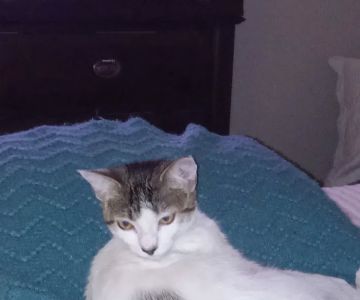How to Recognize and Treat Pet Feline Gastritis
As a pet owner, it's important to be aware of any health issues that could affect your furry companion. One common condition that cats may experience is gastritis, which refers to inflammation of the stomach lining. This condition can cause a variety of symptoms and, if left untreated, can lead to more serious health complications. In this article, we will explore how to recognize the signs of feline gastritis, its potential causes, and the available treatment options to help restore your cat's digestive health.
1. What is Feline Gastritis?
Feline gastritis is a condition where the lining of a cat’s stomach becomes inflamed. This inflammation can result in nausea, vomiting, and other digestive issues. Gastritis can be acute (occurring suddenly and being short-lived) or chronic (lasting over a long period). While gastritis in cats can often be treated with proper care, recognizing the symptoms early is crucial for effective management.
2. Symptoms of Feline Gastritis
Recognizing the symptoms of feline gastritis is essential to ensuring your cat receives the appropriate treatment. The following are some common signs to watch out for:
- Vomiting: One of the most noticeable signs of gastritis in cats is frequent vomiting, which may occur after eating or at random times. The vomit may contain food, bile, or foam.
- Lack of Appetite: Cats suffering from gastritis may experience a reduced appetite or even refuse to eat. This can lead to weight loss and dehydration over time.
- Diarrhea: Some cats with gastritis may experience diarrhea, often along with vomiting. This can further contribute to dehydration.
- Lethargy: Due to the discomfort and pain associated with gastritis, cats may become more lethargic, showing less interest in play and other activities.
- Stomach Sensitivity: Cats with gastritis may react when their abdomen is touched or gently pressed. They might exhibit signs of pain or discomfort.
If you notice any of these symptoms in your cat, it’s important to consult a veterinarian for an accurate diagnosis. Gastritis can sometimes be mistaken for other health issues, so professional evaluation is essential.
3. Causes of Feline Gastritis
Several factors can contribute to the development of gastritis in cats. Understanding the underlying causes can help prevent this condition and provide insight into your cat’s overall digestive health. Common causes include:
- Dietary Indiscretion: Eating spoiled food, trash, or certain human foods can irritate a cat's stomach lining. Overeating or sudden changes in diet can also trigger gastritis.
- Infections: Bacterial, viral, or parasitic infections can cause inflammation in the stomach. Common culprits include Helicobacter pylori and intestinal parasites.
- Stress: Just like humans, cats can experience stomach upset due to stress. Environmental changes, loud noises, or conflicts with other pets may cause digestive issues.
- Allergies: Food allergies or sensitivities can lead to inflammation of the stomach lining, making it more susceptible to gastritis.
- Underlying Medical Conditions: Conditions such as kidney disease, hyperthyroidism, or inflammatory bowel disease (IBD) can also contribute to the development of gastritis in cats.
Understanding these potential causes can help you take preventive measures and create a healthier environment for your cat.
4. Diagnosing Feline Gastritis
If you suspect that your cat has gastritis, it’s important to have them examined by a veterinarian. A vet will perform a physical examination and may recommend additional tests to confirm the diagnosis. These tests may include:
- Blood Tests: To assess overall health and check for underlying conditions such as infections or kidney disease.
- X-rays or Ultrasound: Imaging tests can help visualize the stomach and intestines to check for abnormalities, foreign objects, or tumors.
- Endoscopy: In some cases, a vet may recommend an endoscopy to examine the stomach lining directly and take biopsies if necessary.
Once a diagnosis is confirmed, the vet will recommend a treatment plan tailored to your cat's specific condition.
5. Treating Feline Gastritis
The treatment for feline gastritis depends on the severity of the condition and its underlying cause. Here are some common treatment options:
- Dietary Adjustments: A veterinarian may recommend a bland diet, such as boiled chicken or special gastrointestinal foods, to allow the stomach to heal. Gradually transitioning your cat back to their regular food is important.
- Antibiotics or Antifungals: If an infection is the cause of the gastritis, antibiotics or antifungal medications may be prescribed to treat the underlying infection.
- Anti-inflammatory Medications: Non-steroidal anti-inflammatory drugs (NSAIDs) may be used to reduce stomach inflammation. However, these should only be used under the guidance of a vet to prevent further digestive issues.
- Probiotics: Probiotics can help restore the balance of healthy bacteria in the gut, promoting digestive health and reducing inflammation.
- Stress Management: If stress is a contributing factor, working to reduce stress in your cat’s environment can help. Providing a calm, stable atmosphere with hiding places and quiet spaces can reduce anxiety.
In severe cases, hospitalization may be required for intravenous fluids, medications, and other supportive care. Follow-up visits to monitor progress are important to ensure your cat’s condition improves.
6. Preventing Feline Gastritis
While you cannot always prevent gastritis in cats, there are several measures you can take to reduce the risk:
- Maintain a Consistent Diet: Avoid sudden dietary changes and stick to high-quality cat food that meets your cat’s nutritional needs.
- Avoid Table Scraps: Prevent your cat from eating human food, as some foods can be harmful to their digestive system.
- Manage Stress: Minimize environmental stressors and provide a safe, calm living space for your cat.
- Regular Veterinary Check-ups: Annual check-ups with a vet can help detect any underlying health conditions early and ensure your cat is in good health.
By following these preventive measures, you can help reduce the likelihood of your cat developing gastritis and ensure they stay healthy and happy for years to come.
If you're concerned about your cat’s health or need advice on managing feline gastritis, visit Hidden Brook Veterinary for expert care and guidance.












